Some of the Best Natural Sleep Aids to Help You Fall Asleep
| Rank | Products | Highlights |
| #1 | 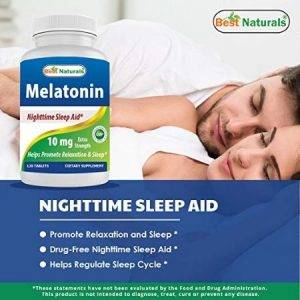
Melatonin |
|
| #2 | 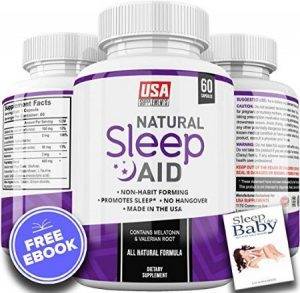
Chamomile |
|
| #3 | 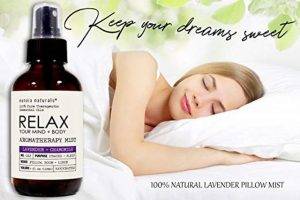
Lavender |
|
Every human being has a natural sleep-wake cycle which is called the circadian rhythm. Whenever the body maintains that rhythm, people get just the right amount of rest they need, by falling asleep when the body dictates it and waking up when it feels rested. However, this sleep-wake pattern is often disrupted by several factors that vary from jet-lag, changes in the working schedule, anxiety that causes muscle tension, inability to calm down during a stressful event and so on.
Sadly, the first impulse of people who have a disrupted sleep cycle is to take sleeping pills. While these pills are effective, they should never be taken without a doctor’s consultation and for a long period of time. Alternatively, one can opt for natural sleep aids that have fewer side effects and are a much healthier option.
Do You Need a Sleep Aid?
- All over Canada and the States, people who suffer from insomnia often turn to sleep aid to help them get a decent night rest. However, sleep aid should always be the doctor’s initiative if it’s medication we’re talking about. In order to determine if you need a sleep aid, consider the following:
- Does insomnia get in the way of performing your daily activities? Sometimes, a simple change in one’s routine, like thirty minutes of exercise is each is just what you need to get a good night’s rest.
- Most of the time, insomnia is just a short-term problem, in which case sleep aid may be of good help. Sometimes, insomnia can be a cause of things like jet-lag, a change in your working schedule, a new baby or some other event that just takes time getting used to.
- If that’s not the case, try to determine if your insomnia could have a deeper, psychological explanation.
Sleep aids are not a replacement for good and healthy sleeping practices. If your insomnia isn’t a short-term one, you will have to use non-medical approaches.
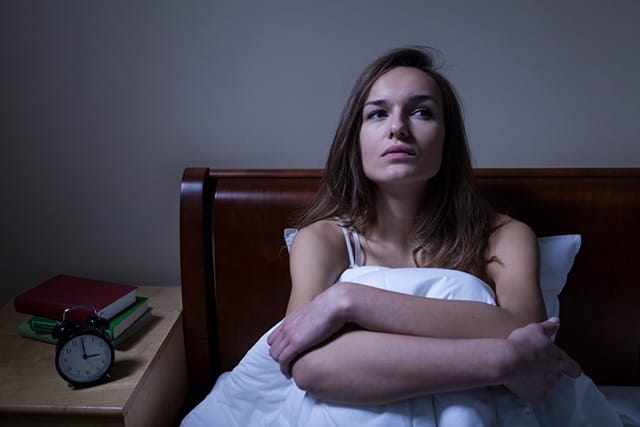
Risks of Taking Sleeping Pills
First and foremost, nobody should take sleep medication without a medical prescription.
It’s commonly known that people who suffer from depression are more likely to try and induce sleep and will often abuse such medication. Even if that’s not your case, medicating yourself is always the second-best choice after choosing a natural remedy for your problem. There’s a common tendency for people to turn to prescription sleeping aids, because what’s easier than swallowing a pill and dozing off? While this article is not meant to dismantle all the benefits of taking sleeping pills, it’s meant to raise awareness of the fact that this isn’t always the best, even if it’s the simplest one.

Tolerance
This is pretty much true with any form of medication you take: the more you turn to them, the more likely your body is to build up tolerance up to a point where they barely have any effect. Consequently, when you notice that taking sleeping pills don’t work as they used to, the first solution that comes to mind is to take one more. Increasing the dosage is bad for your health and, in some cases, it could also be fatal.
Too many sleeping pills can cause difficulty in breathing and we don’t have to tell you what the consequences of that are. In order to prevent building up a tolerance for sleeping pills, one must avoid taking them for a period longer than one or two weeks. There’s nothing wrong with taking sleeping pills if you’re experiencing a short-term sleeping disorder, just make sure you don’t abuse them.
Dependence
Ultimately, every form of medication is like a drug. Some people are addicted to painkillers and some become addicted to sleeping pills. You know how alcoholics that stop drinking or heroin addicts that stop using go through a cleansing period when the body is in so much pain, the first impulse is to start consuming these substances again? A person that’s addicted to sleeping pills and suddenly stops taking them could suffer from “rebound insomnia”.
To avoid this, consult a doctor that can establish a schedule for you to gradually stop taking the pills. By slowly reducing dosage, you have higher chances of avoiding unwanted side effects.
Behavior
Believe it or not, consuming too many sleeping pills can actually lead to sleepwalking. This is, probably, one of the most dangerous things that you want to avoid, as waking up and not knowing where you are is only trouble. If you ever notice this kind of behavior in your partner who’s taking sleeping pills (or vice-versa), make sure you report it to the doctor immediately.
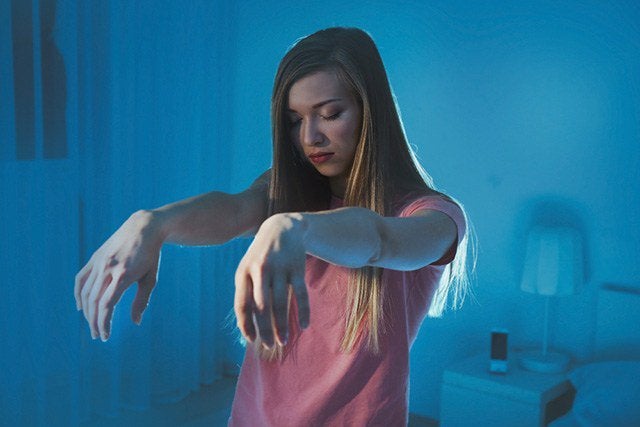
You may want to read: Prescription Sleep Aids
Side Effects
There is a direct link between taking sleeping pills and your chances of losing equilibrium and falling down. Your body’s inner sensors are responsible with measuring your gravitational center and when you are under the influence of drugs that can impair those sensors, you are likely to fall down. Even more, when you take sleeping pills that contain zolpidem, chances are the drugs will still be present in your bloodstream the morning after and this impaired activities such as driving.
Top 5 Best Natural Sleeping Aids Reviews
#1. Valerian
OVERVIEW
- Latin name: Valeriana officinalis
- Administration: between 400 and 900 mg
- Valerian Sleep Aids: DRIFTOFF Premium Sleep Aid, Carlyle Valerian Root Extract
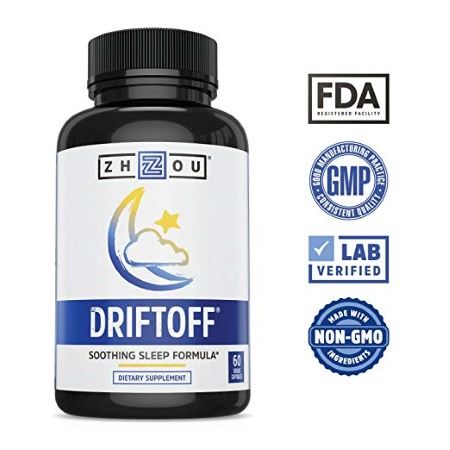
Several studies have shown that valerian can be a good solution for people who suffer from insomnia. Even more, there are currently some mixed scientific opinions on whether valerian can also help reduce anxiety. There are people who refer to valerian root as “nature’s Valium”, as it has been used for quite some time for sleep induction and reducing anxiety levels. Centuries ago, valerian flowers were a primary ingredient in the perfume industry and its root has been used in natural medicine practices for about 2,000 years.
So, how does valerian help people sleep better? The root of the plant contains a mixture of compounds like valerenic acid or various antioxidants. The root of the valerian plant has a very powerful smell that most people find unpleasant, which is why it’s recommended to consume valerian in the form of a tincture or a pill. The plant is mostly used in combination with other herbs to give people a calming state. One of the most common natural sleep aid combinations is valerian and hops, a plant used to make beer.
If you’re suffering from insomnia, valerian might be a suitable choice, as this plant was intensely studied to see if it has any sleep aid benefits. Whether administered on its own or together with hops, valerian does indeed help improve sleep. It helps people fall asleep faster, improves the quality of their sleep and induces a deeper sleep, for a full eight hours of rest.
Pros
- Lowers body temperature to induce sleep.
- Reduces the amount of time necessary to fall asleep.
- Reduces hot flashes during menopause.
- Lengthens the sleep interval.
Cons
- Acts as a sedative, so it’s best to avoid driving when under its effect.
- Avoid consuming alcohol while taking valerian.
#2. Melatonin
OVERVIEW
- Administration: for insomnia, 2 to 3 mg
- Melatonin Sleep Aids: Best Naturals Melatonin, DREAMFULLY Natural Sleep Aid
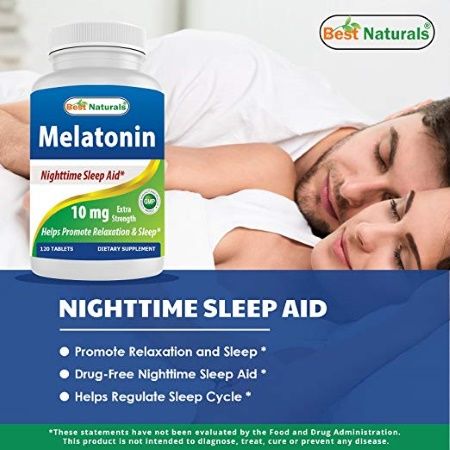
Although melatonin is a hormone secreted by the pineal gland, there are also m
latonin supplements that people can buy and take when they want to induce sleep. The pineal gland is located above the middle of the brain and it’s about the size of a pea. This hormone acts as our body’s natural alarm clock, telling us when to go to bed and when to wake up. This is why our body secrets more melatonin during the night and drops considerably as morning hours approach.
How much melatonin the pineal gland secrets is a consequence of your daily exposure to light and your body’s natural rhythm. As for melatonin supplements, they can be purchased in the form of liquid, pills or chewables. They are available either in natural or synthetic form, the former being made from animal’s pineal glands.
Melatonin natural sleep aids have been known to help with insomnia for quite some time now. They are very common amongst people who have to adjust to new sleeping schedules because of their working hours, but also for people who suffer from jet-lag. It’s a well-known fact that each human’s body will react differently to the same type of supplements, which means that melatonin might not be effective for every individual. If you suffer from insomnia, it’s best to take a melatonin supplement about half an hour or one hour before going to bed.
Another interesting thing is the effectiveness that melatonin has sleep disorders in blind people. It seems to be effective when ingested by both blind children and adults. Melatonin also aids in the delayed sleep phase syndrome but also helps regulate sleep-wake cycle disturbances.
Pros
- Helps people with trouble falling asleep.
- Effective for people who suffer from jet-lag.
- Efficient in regulating sleep-wake cycle disturbances.
- Has proven to be an effective sleep aid for children and teens with intellectual disabilities, such as autism.
Cons
- Interferes with ovulation.
- Is not recommended for pregnant women.
- Should not be used by people suffering from depression.
#3. Chamomile
OVERVIEW
- Latin name: Matricaria chamomilla
- Administration: no standard dose
- Chamomile Sleep Aids: Natural Sleeping Aid Pills, Stash Tea Chamomile Nights
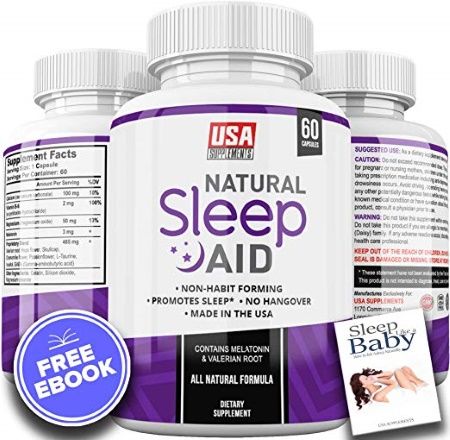
Just like valerian, chamomile is a herb that can aid with sleeping problems. It can be consumed in the form of liquid extract, capsules or tablet, but the easiest and most common way of taking it is in a tea infusion. Chamomile tea is believed to be a really good supplement for the organism, whether you are experiencing sleep problems or not. However, one of its most common properties is being able to relax the muscles and alleviate cramp pain during the menstrual cycle. People turn to chamomile for their sleeping problems because it acts as a mild sedative and helps induce sleep faster compared to when it’s not consumed.
As we’ve already mentioned, chamomile can help with several other problems, as it reduced gas and bloating, it can prevent seasickness and help alleviate all sorts of stomach-related pains.
Chamomile is also beneficial for children and babies, as it can help reduce symptoms of an upset stomach, colics and bowel disorder. When taken in the form of an ointment, chamomile can help reduce swelling caused by insect stings, but can also be used to reduce eye irritations when applied in the form of an eyewash.
But the benefits of using chamomile don’t stop here. A chamomile-based mouthwash can be used for sore gums and it also helps with inflammations of your oral cavity. When used in the form or a lotion or wash, it can help alleviate pain caused by hemorrhoids or dermatitis.
Pros
- Acts as a mild sedative that induces sleep.
- Helps with menstrual cramps.
- Relaxes the muscles.
- Helps cure several stomach-related problems.
Cons
- Causes vomiting when taken in larger doses.
#4. Lavender
OVERVIEW
- Latin name: Lavandula angustifolia (English lavender)
- Administration: two-three drops of essential lavender oil on the pillow/in your hands/bathtub/aromatherapy diffuser
- Lavender Sleep Aids: Lavender Pillow Mist, Best Lavender Essential Oil By Sky Organics
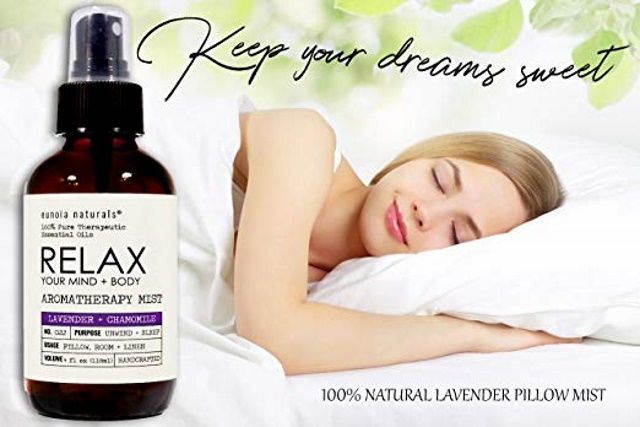
Alarming statistics show that about 30% of American who suffer from sleep disorders claim to have insomnia. Thankfully, natural sleep aids such as lavender bring people one step closer to solving these problems without the implications and negative effects of heavy medication. Lavender can be used in several forms, like oils and tinctures. Aromatherapy has been part of relaxation methods for quite some time now and everyone who loves a good essential oil knows that lavender has some of the most soothing effects ever.
By trying some aromatherapy with lavender before bedtime, you can induce a tranquil effect that will help you fall asleep faster. The explanation is simple: when your brain senses a certain smell, it sends signals to your heart to help decrease blood pressure, inducing a state of relaxation. You can simply add a few drops of lavender oil on your pillow, or purchase an aromatherapy diffuser that converts this oil into a fine mist which is released in your bedroom.
Alternatively, you can opt for lavender lotions or you can apply essential lavender oils in your hand. With just two or three drops of these oils, gently rub your palms together and then sniff them. You can also add a drop of oil on your temples or your wrists. Some people like to add lavender oil into a full bathtub and enjoy the scent before going to bed.
Pros
- Can be purchased in the form of essential oils that are really affordable.
- Versatile enough to be used in various situations.
- Works great when paired with an aromatherapy diffuser.
- Helps decrease heart rate and blood pressure.
Cons
- To be avoided in combination with sedative medication, as it slows down the nervous system.
#5. Passion Flower
OVERVIEW
- Latin name: Passiflora incarnata
- Administration: Liquid extract – 1 ml orally/3 times a day; Tincture – 0.5 to 2 ml orally/3 times a day.
- Passion Flower Sleep Aids: Best Natural Sleep Aid, LES Labs Mood Boost

Passionflower is one of those plants who bring a lot of different health benefits to the table. Its most common use is for people who suffer from insomnia or experience high levels of anxiety. Passionflower acts as a mild sedative on your body to induce a calm state and relax the muscles which are often times too tense for us to sleep. But there are many other benefits of passion flower, as studies conducted over the past decade have shown.
It helps to reduce anxiety, especially in women that suffer from menopause depression and experience hot flashes. It has a lot of antioxidant compounds, which push the body in getting rid of free radical molecules that damage it. Since it relaxes the nervous system, it can also help with alleviating several muscle-related pains, especially lower back pain. Passionflower can also lower blood pressure, especially when drinking tea made with this plant. However, people who also use blood pressure medication should avoid consuming this plant, as it can lower pressure down to a hazardous point.
Passionflower is available in several forms. For anxiety, people often take capsules that contain passion flower or liquid extract. It can also be consumed in tea form, as dried passion flower plants are available for purchase.
Pros
- Help reduce anxiety, especially during menopause.
- Relaxes the muscles to induce sleep.
- Can help alleviate muscle pain throughout the body.
- Has antioxidant properties.
- Can reduce blood pressure.
Cons
- Should never be paired with sedative medication.
Conclusion
Even though natural sleep aids are way better for your body compared to sleeping pills and other forms of sleep-inducing medication, it’s always best to start off by using small doses. If you’ve never tried even a natural remedy before, you don’t know how your body is going to react. Even if lavender oil is amazingly soothing, there are actually people who are allergic to lavender.
Always keep in mind how important sleep is in your daily routine and how lack of sleep can affect performance, health, and relationships. Having a healthy lifestyle means getting the hours of sleep your body requires to function in normal parameters. Aside from using natural sleep aids, you can always try to cut out caffeine from your diet, especially in the second half of the day. Breathing and physical exercises can also go a long way, as they consume some of that left-over energy and help you doze off faster. If you’re a huge fan of taking a warm bath before going to bed (which is highly recommended to induce that sleeping state), try adding a few drops of natural oils that are known for calming down the muscles and nerves. And remember: steer clear of sleeping pills as much as you can, especially if you don’t have a medical prescription for them.
